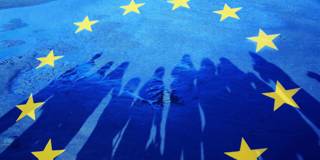The European Union survived a decade of convulsions before the pandemic in the best way possible: by deepening its integration. By responding to the COVID-19 crisis in the same way, the bloc can emerge stronger, rather than merely demonstrating resilience.
MADRID – The word “resilience” has been used a dizzying number of times since the COVID-19 pandemic was declared a year ago. Most interpret resilience to mean the opposite of fragility – the most that many families and businesses can hope for in these unfortunate times. But as a collective aim, resilience lacks ambition. The true antonym of fragility is something bolder, and Europe in particular can and should go further in pursuing it.
In his 2012 book Antifragile: Things that Gain from Disorder, Nassim Nicholas Taleb points out that “the resilient resists shocks and stays the same,” whereas “the antifragile gets better.” The concept reminds us of the German philosopher Friedrich Nietzsche’s popular adage, “What doesn’t kill me makes me stronger.” Referencing this aphorism may seem somewhat frivolous, given the pandemic’s human toll and the enormous suffering it has caused. However, its logic is clearly applicable to certain contexts.
Our immune system, for example, operates in precisely this manner, allowing vaccines to stimulate the production of antibodies by using an infectious agent. In terms of public policy, our health systems can be expected to emerge stronger from the pressure they are currently under, eventually attracting more resources and making better use of them. And, beyond national borders, Nietzsche’s adage rings true for some multi-level governance structures, such as the European Union.

MADRID – The word “resilience” has been used a dizzying number of times since the COVID-19 pandemic was declared a year ago. Most interpret resilience to mean the opposite of fragility – the most that many families and businesses can hope for in these unfortunate times. But as a collective aim, resilience lacks ambition. The true antonym of fragility is something bolder, and Europe in particular can and should go further in pursuing it.
In his 2012 book Antifragile: Things that Gain from Disorder, Nassim Nicholas Taleb points out that “the resilient resists shocks and stays the same,” whereas “the antifragile gets better.” The concept reminds us of the German philosopher Friedrich Nietzsche’s popular adage, “What doesn’t kill me makes me stronger.” Referencing this aphorism may seem somewhat frivolous, given the pandemic’s human toll and the enormous suffering it has caused. However, its logic is clearly applicable to certain contexts.
Our immune system, for example, operates in precisely this manner, allowing vaccines to stimulate the production of antibodies by using an infectious agent. In terms of public policy, our health systems can be expected to emerge stronger from the pressure they are currently under, eventually attracting more resources and making better use of them. And, beyond national borders, Nietzsche’s adage rings true for some multi-level governance structures, such as the European Union.